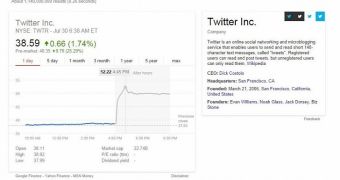For the first time since it went public, Twitter managed to completely surprise everyone with the great results it obtained in the year’s second quarter.
The company’s revenue grew 124 percent since last year to $312 million (€232.8), while the net loss for the same quarter was of $145 million (€108.2 million).
“Our strong financial and operating results for the second quarter show the continued momentum of our business. We remain focused on driving increased user growth and engagement, and by developing new product experiences, like the one we built around the World Cup, we believe we can extend Twitter’s appeal to an even broader audience,” said Dick Costolo, Twitter’s CEO.
According to the company, the number of monthly active users rose to 271 million, which is 24 percent over last year’s results, while the number of mobile users grew 29 percent to 211 million. This means that 78 percent of all people logging onto Twitter at least once a month also chose to do this via their smartphones.
Another great stat for Twitter was given by the advertising revenue per thousand timeline views, which reached $1.60 (€1.19) in the second quarter, an 100% year-over-year increase.
Most of the success Twitter saw in the past quarter can likely be correlated to the World Cup from Brazil, which managed to generate huge traffic on the site.
The company’s stock skyrocketed following the announcement of the financial results. In after hours trading, Twitter’s stock rose to $52.22 (€38.97) after closing at $38.59 (€21.33).
After Twitter presented its financial results, CEO Dick Costolo agreed to answer a series of questions for CNBC. People could ask the exec questions over Twitter by using the #AskCostolo hashtag.
While the questions covered a lot of topics, many of them centered around the way Twitter dealt with user safety and privacy, and most importantly, how the company handled all the bullying and harassment taking place on the platform.
CNBC said that over 30 percent of the questions were related to user safety, privacy and abuse, which puts the number at about 2,500.
Just as it happens on Facebook and on other social networks, these issues are very much present and affecting users who find themselves bullied for their beliefs, the way they look and what they say. Of course, it can be argued that the anonymity offered by the Internet allows people to hide behind fake names to be rude, which makes bullying a wide problem. This doesn’t mean, however, that Internet companies shouldn’t get involved in fighting against this.

 14 DAY TRIAL //
14 DAY TRIAL //